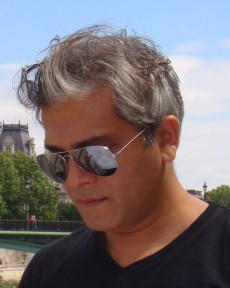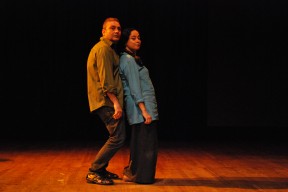Everything becomes a memory one day. Some memories make us and some, we make. Some we edit, some alter us. Life is not just what happens to us but we think happened to us. But nothing is more vivid than the time when we were experiencing the world with untutored eyes, with young senses as yet burdened with preconception. Youth in hindsight is nothing more than the ability to feel everything deeply. The joy. The pain. The discoveries. Age is nothing but the loss of this ability to register life as if it was happening for the first time. It is nothing if not a fading memory of the way we were and what the world around us was like.
 The Company Theatre’s production The Blue Mug (See their poster on our home page and click to get more details) is the receptacle of seminal memories that say things about not just us but the times we grew up in.
The Company Theatre’s production The Blue Mug (See their poster on our home page and click to get more details) is the receptacle of seminal memories that say things about not just us but the times we grew up in.
The play will soon arrive in Bangalore with its stellar cast of Rajat Kapoor, Ranvir Shorey, Vinay Pathak, Sheebha Chaddha, Munish Bhardwaj and Shipra Singh.
Unboxed Writers caught up with director Atul Kumar to jog a few of his memories about his life and work..
Memories are nebulous things..how do you weave a story out of them or is The Blue Mug just about moments we have lived?
It is mostly the latter. On stage the actors simply narrate their own real life memories from the past. there is no other narrative or a story. Only interjected by fictionalizing of one of the essays by Oliver Sacks which again is a neurological study of one of his patients.
The Blue Mug works on two levels, the personal memory, and the bigger business of a cultural identity…what do you most remember about your formative years? The things that impacted you most as a person and a creative mind?
Ha, if I did this well, I would be acting in the play myself! I think the thing that most impacted me, my growth, my identity and therefore is also my strongest memory is my growing years in Old Delhi where I was born and spent the first 21 years of life. Its smells, tastes, textures, rhythm, language and stories are still very vivid and alive in me. I can easily say that this is what made me or grounded me. It also formed the biggest part of my identity and is reflected always in my work, creative or otherwise.
People who know me closely often joke about the lane that I lived in, ‘Gali Tota Maina!’ The business I would have been – ‘that of selling dry fruits and pickles’, my street language- coloured with foul Hindustani words which I used amongst my gulli friends and of course the frequent political incorrectness in Old Delhi when I was growing up.
What are the gaps in contemporary Indian theatre that you would want to be filled? Are we confident enough to tell our stories in our language (whether regional, English or Hinglish) and with our own reference points? More stories like The Blue Mug?
It is way beyond me to talk about such big things as gaps in contemporary Indian theatre. As far as I know and have seen over the last 25 years of being in this field, there are more and more people interested in this art form and in various parts of India, people are producing some very exciting theatre which is worthy of international stage. And a lot of it actually does travel and is recognized internationally.
I cannot think of a time when in ancient or modern or even contemporary theatre, we ever stopped telling our stories. And in many languages- more so in theatrical language which is beyond English, Hindi or Hinglish or any other regional language. Yes, The Blue Mug talks of this quite directly, however, in all of India’s great theatrical literature of the past and present, the reference points are often subverted and interpreted to create drama and may even rise above the specifics. I think it all works only when the essential is based on our own reference points whether directly out or indirectly. Having said that, sometimes we still fail.
How do you choose actors for a play? How did you cast The Blue Mug for instance?
We never audition. We workshop and improvise with whoever is interested. And slowly it becomes evident who is doing what to the whole team. Especially in devised work, since we do not have set scripts, we often fail day after day and the less patient actors automatically leave us. The others stay. That is exactly how The Blue Mug was designed. Only some of us had worked with each other in the past and were ready to fail with each other.
What was the process of the play like? From the blue print of an idea to The Blue Mug, it is now?
The play has changed immensely since the first idea to the first run to the second run and now. More so because it is highly improvised and we do not have a fixed script that is recorded or written. Actors are free to improvise from show to show. However, there is a solid structure to the play that guides them. The most important part is their own narratives of their personal memories and that needs to be shared with the audience as if they are remembering the moment of their past there and then- which is quite difficult as a performance but they try and do the same in each show.
This is also the reason why over a few years some actors felt some of their memories which they shared held no value for them anymore as their lives changed- so we brought in more new ones and let go of some old ones. The blue print was simply this that we wanted to do a play about memory and memory loss and after much explorations we hit upon this idea to simply dive hard into our own past and dig out memories of all kinds covering all emotions. Once we had a million of those in hand, we started re-telling them- then we slowly realised how much we lie about our memories. How much we forget. And how important it is to forget as much as it is to remember. And so on…and before we knew The Blue Mug emerged.
What kind of memories you have of Bangalore? Of Ranga Shankara?
Very very fond memories. I directed the first festival of Ranga Shankara when it opened and helped in some small ways in its last six months of completion- so yes, it is very dear space to me. I met some of the most beautiful people of my life here and made some of the best friends in the process. Bangalore has always supported my work not only as an audience but also as my donors and sponsors and general well wishers.
Tell us a bit about your own journey till this point? What do you want to achieve further?
We are making a theatre village in Kamshet close to Lonavala. It is an international theatre laboratory where artists would come and live and explore and fight and negotiate newer ways of working and finally, produce new work. It has been a dream since the last 15 years. It is finally coming true. That is the only next step and probably will see me through till the end of my days…hopefully in the process we will create some important work?!
The Blue Mug plays at, Rangashankara (J P Nagar)
July 2, Saturday, 7:30 pm, July 3, Sunday, 3.30pm & 7:30 pm
Bookings: www.indianstage.in , Tele-bookings: 9886334291, Tickets also available at gate
Reema Moudgil is the author of Perfect Eight (http://www.flipkart.com/b/books/perfect-eight-reema-moudgil-book-9380032870?affid=unboxedwri )







I have seen the play, blue mug. It’s fantastic. The structure and the performances were brilliant.